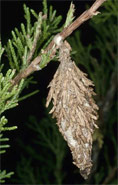This news item expired on Monday, June 30, 2014 so the information below could be outdated or incorrect.
From: Adam G. Dale, Graduate Student & Steve Frank, Department of Entomology
 Since entomologists at NCSU have noted bagworms hatching in Raleigh, Buncombe County gardeners can be on the lookout for these tiny caterpillars with tiny upright bags anywhere bags may have been left from last year.
Since entomologists at NCSU have noted bagworms hatching in Raleigh, Buncombe County gardeners can be on the lookout for these tiny caterpillars with tiny upright bags anywhere bags may have been left from last year.
Bagworms feed on plant foliage and can cause a significant amount of damage in a relatively short period of time. Although they mostly prefer conifers – junipers, Leyland cypress - they also infest maple, sycamore, oak, poplar and apple.
The early caterpillar stage produces a silk bag on their posterior end that gradually collects plant tissue debris from them feeding. This creates a leafy bag that camouflages them and makes control difficult and/or time consuming. One of the most effective treatments is handpicking or cutting the female pupae bags from off the branches.
Bagworms don’t move much during their lifetime and so they are commonly found in dense populations within the same tree. These dense populations have the potential to kill conifers within one to two seasons, due to defoliation.
There are chemical control options available that should be applied during the early stages of the caterpillars, typically during June and early July. As with many other pest insects, bagworms are susceptible to predation from parasitoids and birds that can also assist in their control.
If you’ve had bagworms in the past or have evergreens in your garden now is the time to look closely at your plants and take action against them.
For more information, call Buncombe County Cooperative Extension at 255-5522.